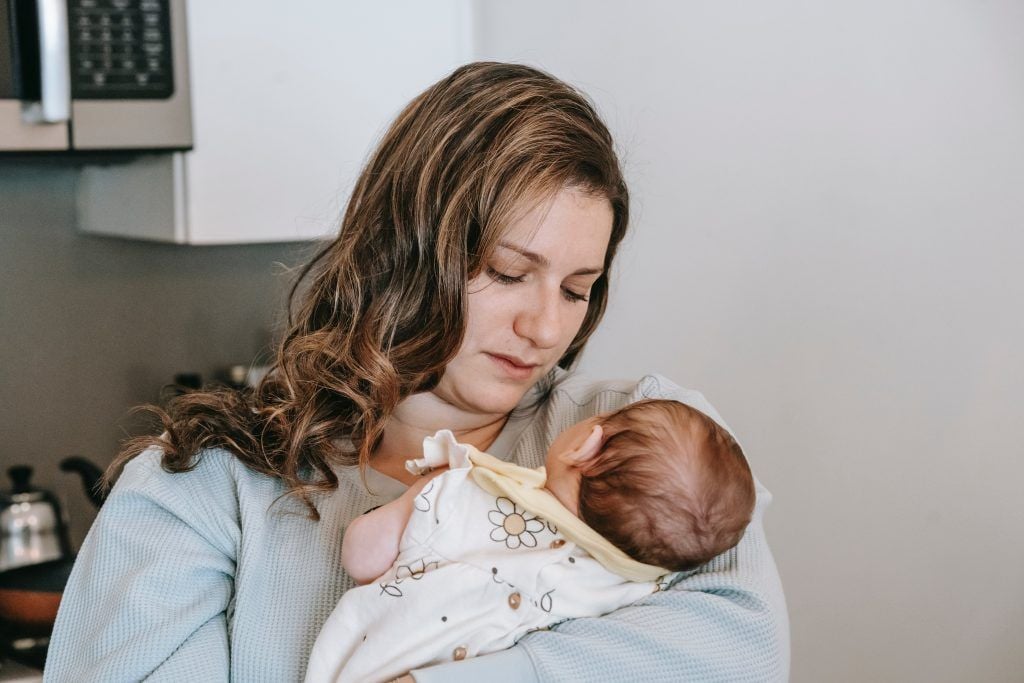Beyond the Baby Blues: How to spot the symptoms of postpartum depression and postpartum anxiety disorders and how to seek help.
Postpartum depression and anxiety disorders are common, but serious issues affecting many new parents.
After giving birth, most new moms will experience a variety of emotions — from joy to fear, excitement to exhaustion — and have a variety of responses to those changing feelings.
While most will have bouts of what’s commonly called “the baby blues,” or feelings of sadness coming and going in waves, some will experience a more intense version of depression. For some, this manifests in common symptoms of depression, for others it may be that anxiety traits are the most pronounced. Often, there is a combination of depressive and anxiety symptoms, which is why this cluster of emotional challenges is sometimes referred to as Postpartum Mood and Anxiety Disorders or PMADs.

There are many reasons why a new mom could experience postpartum depression (PPD):
- Hormonal fluctuations outside the normal range in postpartum.
- A history of depression or anxiety.
- Processing a traumatic birthing experience.
- A difficult recovery from birth.
- Complications with your newborn.
- Relationship challenges.
- Inadequate support or care after birth.
Mothers typically show signs of PPD within four to six weeks after giving birth, but symptoms may arise as late as three months postpartum.
Some common symptoms of postpartum depression or anxiety include:
- Severe mood swings
- Excessive crying and feeling depressed
- Sleeping in excess or having insomnia
- Overwhelming fatigue or severely reduced energy levels
- Difficulty bonding with baby
- Intense irritability or feelings of rage
- Feelings of shame or unworthiness about being a “good” parent
- Difficulty in thinking clearly or concentrating
- Feeling overwhelmed with or unable to make decisions
- Withdrawing from family and friends
- Loss of appetite or binge eating
- Reduced interest and pleasure in activities
- Becoming restless
- Unusually high fears around safety, cleanliness, or health
- Overwhelming anxiety and panic attacks
Postpartum Psychosis Symptoms
There is a more severe type of PPD called Postpartum Psychosis which requires hospitalization and advanced medical treatment. There are mixed statistics on how often this disorder occurs in a population and is much more common amongst women who have a history of bipolar disorder or schizophrenia.
The symptoms of postpartum psychosis typically arise around two weeks postpartum and may include:
- Delusions or looming thoughts that are unlikely to be true
- Hallucinations — seeing, hearing, feeling things which are not there is often a symptom of postpartum psychosis
- Manic or severely depressive moods or swinging between the two rapidly.
- A loss of inhibitions or sense of self-awareness/self-control
- Feelings of overwhelming fear, risk, suspicion, and/or paranoia
- Suicidal ideation or thoughts of self harm
- Pronounced restlessness
- Inability to sleep or to stay awake
- Behaving in uncharacteristic ways / changes in personality
Some cases of PPD or PMAD can be treated through finding adequate support systems, talk therapy, somatic therapy, environmental or situational changes, or may fade on their own over time. It is important to be able to speak with a trusted and knowledgeable provider about these symptoms sooner rather than later.
Sad Dads
Co-parents and other primary caregivers can also experience postpartum depression. One study suggests that as many as 1 in 10 first time dads will experience postpartum depression. Many of the symptoms and risk factors for postpartum depression in birthing parents may cause a new father to experience postpartum depression as well. The likelihood of partner depression or anxiety increases significantly if the birth parent is experiencing postpartum depression and/or anxiety.
Increasingly, there are Dads support groups, hotlines, and awareness within the mental health and wider medical community of the prevalence of postpartum depression in men.

Queer families and PPD
LGBTQ+ parents, partners included, may face higher rates of postpartum mood struggles due to widespread stigma, discrimination, legal barriers, strained ties with family, etc. Thankfully, there is growing awareness within and beyond these communities of new parents and corresponding support groups.
When to get help
Some new parents can even feel embarrassed or ashamed of their anxiety or depression postnatally. However, postpartum mood disorders are very common and often can be managed with good outcomes if addressed. Postpartum depression is not a flaw or weakness or sign of being a “bad parent” in any way.
Call your doctor, midwife, OB-GYN or therapist if your PPD symptoms:
- Appear to be getting worse
- Don’t fade or feel easily managed after two weeks
- Make it challenging to complete everyday tasks
- Find you struggling to care for your baby
- Include thoughts of harming yourself or your baby
If you feel that you are/your partner is experiencing signs of postpartum psychosis, contact your doctor immediately.
If you have suicidal thoughts or thoughts of harming your baby, contact your doctor immediately.
Partners, family, friends, doulas, or care providers may detect symptoms of PPD, PMADs, or Postpartum Psychosis before the new mum realizes she is experiencing mood changes beyond the baby blues. Family and support persons can often be helpful in getting you to the help you need.

Treatment for Postpartum Mood Disorders
Treatment for postpartum depression or anxiety will vary depending on the symptoms, patient history with mood disorders, severity of the symptoms, access to support, and mother’s preference for care.
Some possible treatment options:
- Talk therapy
- CBT (cognitive behavioral therapy)
- Medication
- Getting more in-home support (family, postpartum doula, etc.)
Mental Health Hotlines
You can call SAMHSA’s National Helpline at 1-800-662-HELP (4357) Information is available in English and Spanish.









